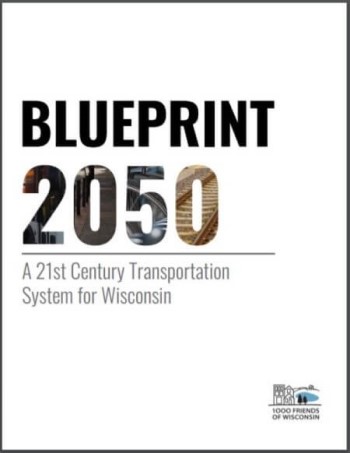Blueprint 2050: A 21st Century Transportation System for Wisconsin
 The United Nation’s Intergovernmental Panel on Climate Change (IPCC) estimates that in order to prevent irreversible and catastrophic climate change, we must keep global warming to less than 1.5 degrees Celsius.
The United Nation’s Intergovernmental Panel on Climate Change (IPCC) estimates that in order to prevent irreversible and catastrophic climate change, we must keep global warming to less than 1.5 degrees Celsius.
Across Wisconsin climate damages are mounting as we begin dealing with more heatwaves, floods, and storms. Increased rainfall and flooding has already prevented some farmers from planting or destroyed harvests due to erosion and saturation. In some places, not only were crops destroyed, but livestock was killed and roads were washed away.
According to Climate Wisconsin – under the climate conditions forecasted, many tree species currently residing in Wisconsin’s Northwoods, like red pine, balsam fir, and paper birch, may fail to reproduce and go locally extinct.
Wisconsin has and will continue to be hit hard.
In the face of this crisis, it is important to know that transportation is the largest and fastest growing sector of carbon emissions, accelerating climate change emissions and threatening communities and ecosystems across the planet.
Moving to a zero-emissions transportation system is critical to addressing the IPCC’s dire warning. While electric generation utilities have taken the first step by committing to produce renewable energy, the pathway forward for the transportation sector remains less clear.
Our transportation system is both carbon intensive and deeply inequitable.
Our funding decisions over the last seventy years have predominantly focused on car-centric infrastructure. While this has created a well-connected road network, it has hindered those who do not, or cannot drive. For many, our transportation system is a detriment, especially for those who rely on other forms of travel outside of personal automobiles.
Our transportation system is also fiscally unsustainable.
Local roads are in disrepair and transit systems are in decline. Any new revenue is devoted to highway expansion. We have invested billions of dollars in new highway infrastructure without addressing the enormous backlog of local road maintenance. This policy, sustained over decades, has left us with exploding debt and increased transportation emissions.
The Blueprint 2050 report explores what policies and budgetary acts are required to move to a zero-carbon transportation system.
The goal of this report is to provide a vision for a zero-carbon, clean, safe, and inclusive transportation system for Wisconsin that will enable informed decision-making.
Along the way, our report will also provide an insight into the existing system’s gaps and shortfalls and make recommendations on the best ways to connect our communities.
